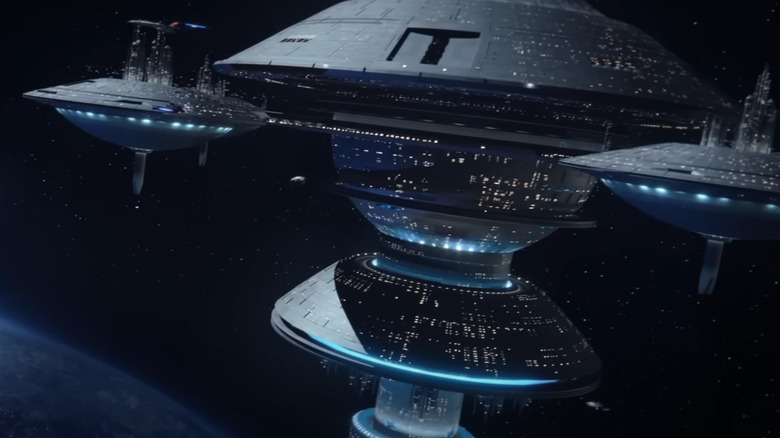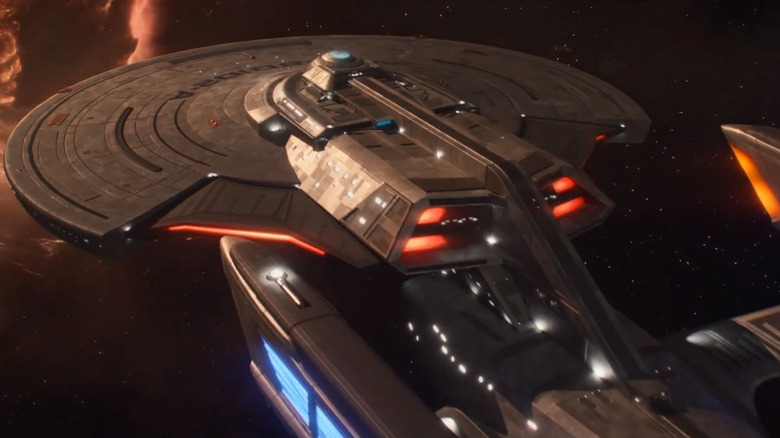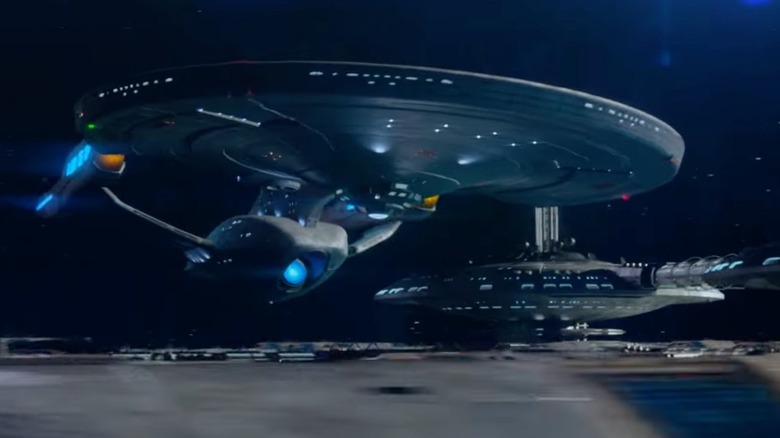The Secret Weapon Of Star Trek: Picard Season 3 Is Its Score
The ships in "Star Trek" don't merely go. They go boldly.
"Star Trek" has long been suffused with an old world spirit of frontiersmanship. The various Trek shows are, overall, about delving deep into the cosmos, straying further and further from Earth, all in an unending quest to expose ourselves to new cultures and new philosophies. "Star Trek," at its best, implies that humanity is constantly engaged in an ongoing peaceful exchange of ideas. Thanks to the Prime Directive — the Starfleet rule that dictates a strict policy of noninterference in the natural evolution of a planet — said frontiersmanship is actively separated from any notions of colonialism. "Star Trek" is bold for the sake of boldness, exploring the galaxy not for reasons of conquest, but humility. The ideal Trek philosophy is to constantly prove, time and again, how small we really are ... and be exhilarated by it.
Of course, with these notions always hanging in the background, the composers on "Star Trek" needed to write music to match. The theme song for the original "Star Trek" TV series was composed by Alexander Courage, and provided the show with a brassy, laidback feeling to Kirk's traversal of the heavens. The quiet opening four-note tinkle of Trek's best-known tune has come to be used throughout other "Star Trek" shows and movies as an aural symbol of smallness. It is a twinkling star. Of course, every star is also a life-giving sun. The "smallness" also denotes enormity.
Over the franchise's history, additional bold musical themes have entered into the lexicon, many of them written by the legendary Jerry Goldsmith, whose theme for "Star Trek: The Motion Picture" also served as the theme for "Star Trek: The Next Generation."
The new season of "Star Trek: Picard" brings Goldsmith's work back.
The music of Picard
In addition to "The Motion Picture" and "Next Generation," Goldsmith also wrote the themes to the films "Star Trek V: The Final Frontier," as well as "Star Trek: First Contact," "Star Trek: Insurrection," and "Star Trek: Nemesis." He also did the theme song for "Star Trek: Voyager." For many Trekkies, Goldsmith's sound is as synonymous with Trek as John Williams' scores are to "Star Wars." This is why it was so weird to hear Russell Watson sing "Faith of the Heart" as the theme for "Star Trek: Enterprise." It was just ... off.
"Star Trek: Picard" doesn't just recreate the Goldsmith sound, but literally reuses his scores. "Picard" abandons the theme it used in its first two seasons (written by Jeff Russo) and moves its title sequence to the end of each episode. The music over the end credits is Goldsmith's exact score for "First Contact." It's not even a re-orchestration. It's just the same music again. Throughout "Picard" as well, other Goldsmith quotations are used quite heavily, including the notorious "BWAAAAM" sound used throughout "The Motion Picture."
These musical quotations don't feel like a mere retread, however, and aren't included for mere nostalgia. They, instead, give "Picard" a classical feeling, subconsciously legitimizing the show in the minds of Trekkies everywhere. For years, it seemed that newer Trek shows were hellbent on skewing as far as possible from the franchise's established hallmarks. The newer shows were more violent, and focused more on war and action and the new scores were altered appropriately. The music no longer indicated frontiersmanship, but mayhem. The music is fine, but the mood was just as ... off as the presence of Russell Watson.
As such, having the music back in place for the new season of "Picard" is a boon.
Going boldly
Not that "Picard" isn't without its mayhem. Indeed, the first part of the new season is meant to play like one of the "Next Generation" feature films, and those movies tended to be more action-forward than their television counterparts. "Picard" also evokes "Star Trek II: The Wrath of Khan," one of the more popular films in the franchise, and one of the more battle-centric.
But the action is not the centerpiece of the show. Indeed, the makers of "Picard" seem to have realized that many Trekkies love to simply look at the fictional technology on display. The camera lingers on computer control panels, glowing warp nacelles, and curved starship hulls more than in previous seasons. Vehicle fetishists drool, and Goldsmith plays on the soundtrack. It doesn't take much for Trek to feel like Trek, and those two elements — vehicle fetish and awe-inspiring music — are at least 50% of it. The rest, of course, would be a story that incorporates interesting science fiction ideas, a well-wrought working relationship between the characters in a professional setting, and dialogue devoted to diplomacy and multiculturalism.
The new season of "Picard," unlike the previous seasons, contains elements of all those things. For good measure, it makes a lot of fun, in-universe references.
The new season is astonishingly better than the previous two, and one can point to the music as being a large part as to why. It seems minor, but the mood of "Picard" is dramatically altered by it. It feels like the going is once again bold.


